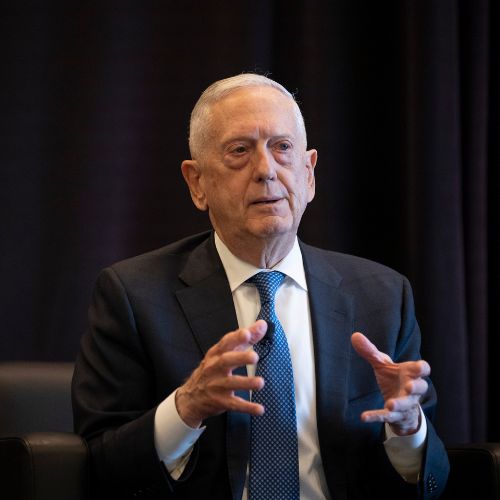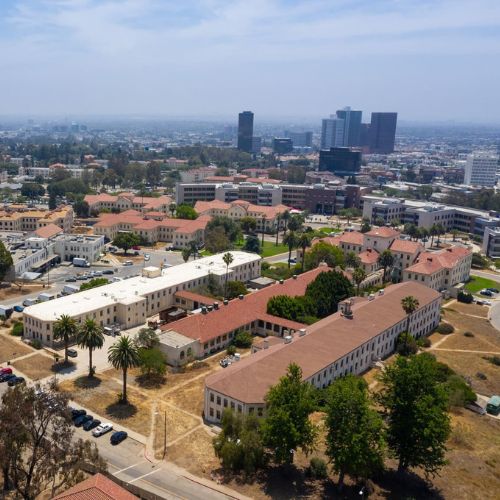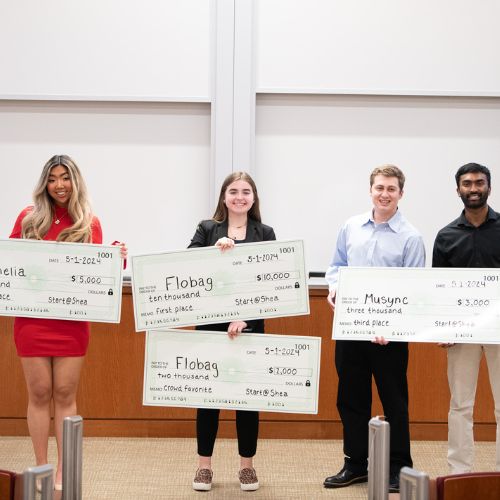Every semester, the centers across the Carroll School host countless events for Boston College community members to listen to, learn from, and engage with industry experts on timely topics. Recent events explored the important role of women when it comes to shaping American democracy, seeing the opportunities in a challenging real estate landscape, the bright future of student entrepreneurship, and more. Here is a taste of these happenings.
Democracy in Action
The timing of this fall’s Clough Colloquium felt particularly fortuitous. Not only was the event falling just five weeks before the presidential election, but it also coincided with President Jimmy Carter’s 100th birthday. Naturally, there was no shortage of topical material for the evening’s speaker, acclaimed political historian and Boston College history professor Heather Cox Richardson, to mine. And there was no better place to do it than the twice-annual colloquium. Hosted by the Winston Center for Leadership and Ethics, the series invites leaders from across fields to share the big lessons of their personal and professional journeys.
As Gregory Kalscheur, S.J., dean of the Morrissey College of Arts and Sciences, welcomed the packed Heights room, he identified himself as one of more than a million daily readers of Richardson’s Letters from an American newsletter, which puts current events into larger historical context. Richardson is currently on leave from her role as professor of history at Boston College, and was quick to thank the University as she reached the podium. “I want to make it very clear that I could not do what I do without the support of Boston College,” she said. “They have had my back when anything has come up, which happens on a very frequent basis.” That includes, of course, the publishing of her New York Times bestselling book Democracy Awakening: Notes on the State of America and her recent win of the Authors Guild award for literary criticism.
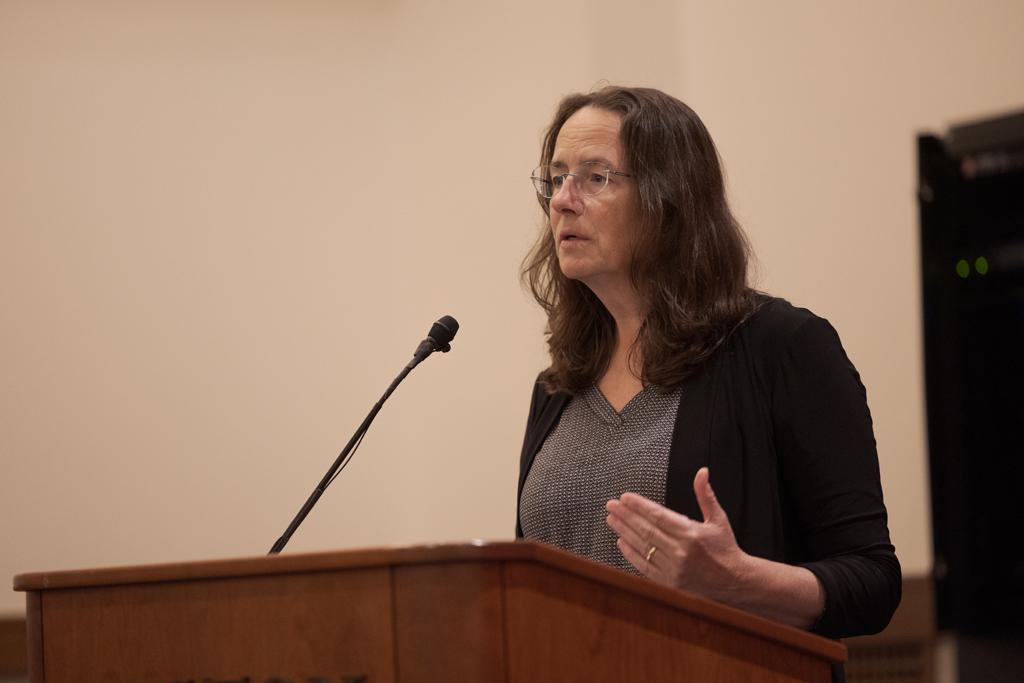
Heather Cox Richardson speaking at the Clough Colloquium on Oct. 1
Kalscheur added that in Democracy Awakening, Richardson quotes Carter’s farewell address. “President Carter reminded us that the national interest is not always the sum of all our single or special interests,” he said. “We are all Americans together, and we must not forget that the common good is our common interest and our individual responsibility.”
These ideas of common good and community power, particularly in the face of misogyny, loomed large in Richardson’s speech. “If there’s one thing that strikes me about this moment,” she said of the current political climate, “it is both the truly extraordinary misogyny of this moment and the extraordinary efforts of American women to take up a place in American society and turn back that misogyny.”
Richardson sees women as the makers of the modern American state and therefore believes they are also essential in shaping what the future of American society and politics can look like. To illustrate this idea, her speech wound its way from the enduring legacy of Frances Perkins, Secretary of Labor under FDR and an architect of the New Deal and Social Security, to Vice President Kamala Harris, both political figures that have emphasized the importance of women in society as a fundamental part of democracy.
“[Kamala Harris] did not talk about [possibly] being the first woman to be elected president. She did not talk about identities,” Richardson said of Harris’s recent speech at the Democratic National Convention. “She talked about community, and often female based community.”
“ “If there’s one thing that strikes me about this moment, it is both the truly extraordinary misogyny of this moment and the extraordinary efforts of American women to take up a place in American society and turn back that misogyny.” ”
Throughout her talk, she also peppered in familiar touchpoints of American culture, including cowboy motifs, Little House on the Prairie, and why it became a tradition to gift watches upon someone’s retirement (hint: It has to do with train conductors).
During the Q&A portion of the event, Richardson leaned into student questions. “BC has the best students,” she remarked, before answering what she referred to as “a brilliant question" from a young man about the real legacy of the women of the American West in politics in a moment where the Democratic party has nominated a presidential candidate from west of the Mississippi River for the very first time.
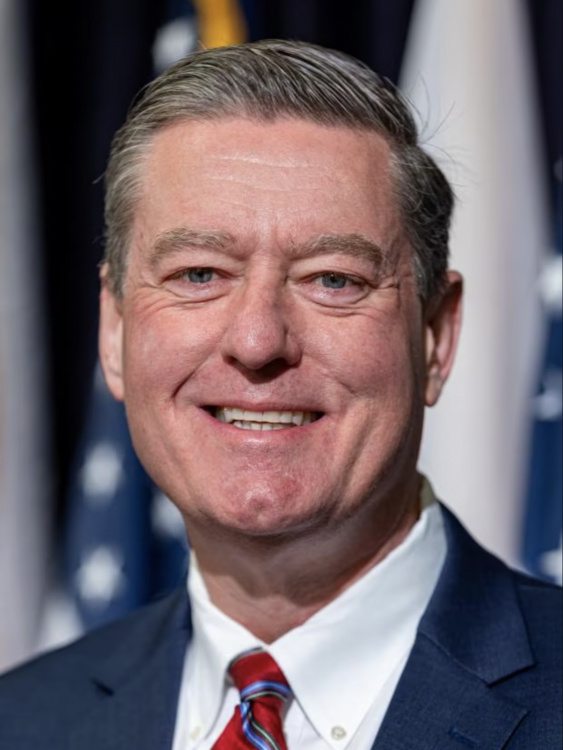
Ed Augustus
With a presidential election just weeks away, it was unsurprising that multiple attendees asked for her thoughts on the possible outcomes, but Richardson shied away from making predictions. “I don’t know how it’s going to play out,” she said, playfully adding that “you guys would all rather I could see the future than the past.”
Elsewhere at the Winston Center, recent events also included an installment of the Ethics and Lunch series with Phil Coupe, MCAS ’90, P '27, co-founder for solar company ReVision Energy; the Women in Leadership Forum featuring Zoe Bogan, founder and CEO of the ZB Agency; and the annual Jane Jacobs lecture with Ed Augustus, secretary of the Massachusetts Executive Office of Housing and Livable Communities, which was presented with the Joseph E. Corcoran Center for Real Estate and Urban Action.
Seeing (and Seizing) the Opportunities
Community was also a key topic of discussion at a recent talk given by John Fish, CEO and chairman of Suffolk Construction, as part of the Corcoran’s Center new Real Estate Colloquium series.
“With a career spanning more than four decades, John Fish is not just a builder of structures but a builder of communities,” Neil McCullagh, executive director of the center, noted in his introduction. Beyond running a business with more than $6 billion in annual revenue, Fish is a prolific philanthropist and the board chair of both the Boston College Board of Trustees and the Brigham and Women’s Hospital Board of Trustees.
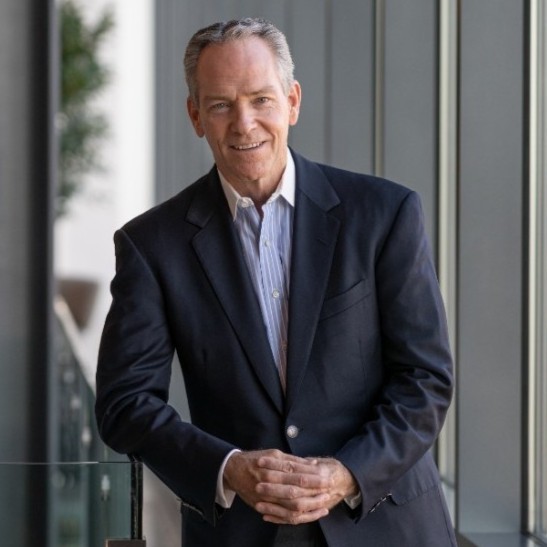
John Fish
Fish kicked off his talk with a big question: Why would anybody want to get involved with real estate today? Citing skyrocketing interest rates, low vacancy rates, and high construction costs, Fish called the current real estate landscape a “‘challenging mess,” but encouraged students to look for the opportunities.
When asked by a student why they should risk getting into a market that experiences such lows, Fish clarified what those opportunities can look like. “[It’s] the opportunity to grow things and transform communities. You make an indelible impact on people's lives at the end of the day,” he said, adding, “if you do it right you can make a lot of money, but that doesn’t mean everything.”
Engaging with the students in attendance, he also made sure to highlight their essential skills as a part of the technological generation. “To me, younger individuals, like the people in this room, have much more of an understanding of technology and what technology can do than the older generation,” Fish said. “That’s why I think real estate is a young person's game. Technology will change the way we look at the business. History can be rewritten and it will be rewritten by your generation.”
The Real Estate Colloquium is designed to provide students with first-hand insights from representatives across the real estate industry. Other speakers this semester have included Richard Roberts, principal of RedStone Equity Partners; Sheila Dillon, chief of housing for the city of Boston; and Michael Corcoran '86, P '15, '20, president of Corcoran Jennison Companies and son of the Corcoran Center’s namesake, Joseph E. Corcoran ’59, H ’09, P ’85, ’86, ’87, ’98.
Getting Down to Business
On an early fall Saturday morning, students, alumni, and business leaders gathered at 245 Beacon Street for the annual Solstice Conference. Hosted by the Edmund H. Shea Center for Entrepreneurship’s student executive board Start@Shea, the annual entrepreneurship conference returned for its third year compressed into a single, action-packed day.
This year’s agenda promised attendees—which included students from 14 local universities—engaging and topical speeches, panel discussions, and interactive workshops, all with the intent to inspire and empower the next generation of business leaders.

Stafford Sheehan MCAS '11
Stafford Sheehan, MCAS ’11, cofounder and chief technology officer of Air Company, kicked off the festivities. Air Company’s mission is to convert carbon dioxide into valuable products such as aviation and rocket fuels, hand sanitizer, fragrance oil, and even vodka. In his keynote presentation, Sheehan reflected on making the decision to leave academia to pursue his entrepreneurial goals.
He received his Ph.D. in physical chemistry from Yale University, but in the end, “I decided to take this path of running businesses rather than an academic path.” That’s because he saw the value of taking innovation out of the lab and into the real world. Now, he’s hopeful that Air Company can make a real impact on CO2 emissions. “Ultimately, we could address 10 percent of global CO2 emissions,” Sheehan said. “That’s really our, I would say, North Star.”
As Sheehan explained how Air Company works, William Munz ’25 sat in the audience appreciating how technical the conversation got. “I basically learned a chemistry lesson,” Munz said. “He used [his] knowledge from school since he was a chemistry [and math] major. Education is an asset.”
The conference also featured a panel discussion on the food and beverage sector, featuring Matthew Fonte ’94 from ColdSnap, Tom First from Culture Pop, and former Athletic Brewing brand strategist Robert Innis. First, who cofounded Nantucket Nectars before launching probiotic soda company Culture Pop, started his entrepreneurial journey right after he graduated college when he started selling his own homemade juices from a boat in Nantucket.
While it seemed like an on-the-fly adventure, the labor and resources required to operate his business were overwhelming. “The barriers to entry for business are way lower than in the past,” he said, referencing how advancements in technology have made entrepreneurship more viable and encouraging students to go after what interests them.
Later on, attendees were able to select from a few different workshops, all offering practical advice on the ins-and-outs of starting a company. Emily Kaiser MCAS '14, a Carroll School adjunct professor, facilitated the "Steering Your Startup Through the Legal Jungle" workshop. She encouraged students to understand the legal complexities of their businesses, including around branding, intellectual property, and sharing trade secrets, adding that people within companies need to play by the same rulebook if they want to be successful.
.jpg)
Tom Coburn '13
The mergers and acquisitions panel discussion featured industry leaders Cory Munchbach MCAS ’09, CEO of BlueConic, and Tom Coburn ’13, CEO and cofounder of Jebbit. The pair shared their insights after BlueConic, a Dutch company focused on helping marketers understand their customers through data-driven insights, acquired Jebbit, a data-capture and experience-creation software for marketers, earlier this year.
“We considered developing a theme for the speakers, but given the diversity of our network, we opted to bring in the best speakers available and organize the day around them,” said Charles Coughlin ’26, a Start@Shea outreach co-chair and one of the event’s organizers. “Our overarching goal was to unite and engage aspiring entrepreneurs in the Boston area. We brought in speakers who could inspire this kind of unity and crafted our Ideathon [session] prompt to ask, ‘What could make Boston the best place ever for aspiring entrepreneurs?’"
The Ideathon competition has become a standout Solstice event, where students engage students in hands-on idea generation around a unique prompt and put all the advice from industry experts into practice. This year’s event came with a twist: Randomly selected student attendees judged the competition. After all, who better to evaluate their peers’ proposals on how to make Boston a better environment for young entrepreneurs?
Emma Mooney ’28, who was attending Solstice for the first time, praised the event’s organization and the dynamic lineup of speakers. “These events make the idea of starting a business seem so cool,” she said, adding that Solstice inspired her to think about what her own future business idea might be.
“Hearing from attendees who told me how much they enjoyed the event made all the hard work worthwhile,” said Coughlin. “If we managed to positively impact even one person’s startup journey, I consider it a success.”




